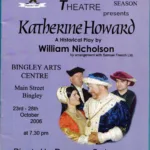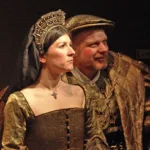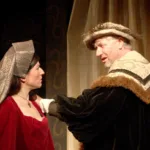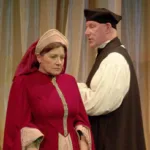Season 59 Play 2 – Katherine Howard by William Nicholson
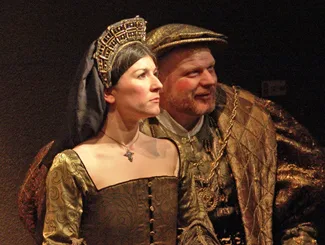
Directed by
Cast
Henry VIII – Paul Chewins
Thomas Culpeper – Dean Ambridge
Anne of Cleves – Gabrielle Cross
Thomas Howard – Robin Martin
Thomas Cranmer – David Thomas
Lady Jane Rochford – Jan Darnbrough
Sir Thomas Wriothesley – Graham Holbrough
Mrs. Mary Hall – Chloe Horsfield
William – Frank Etchells
Capt. of the Guard – David Pedrick
Servants, Guards etc. – Members of the Company.
Synopsis
A slice of Tudor history turned into theatrical magic; May-September romance, intrigue, plots and betrayal. A pointed and sometimes comic portrayal of woman’s lives in Tudor times.
Directors Notes
” A slice of Tudor history?” “May to September romance?” “Political thriller?”
“Love triangle tragedy?”
The play, “Katherine Howard” , can be seen as all of these and more. Beginning with Henry’s marriage to Anne of Cleves and ending with the death of Katherine Howard, William Nicholson, better known perhaps as the writer of “Shadowlands”, has taken the story of the rise and fall of Henry VIll’s fifth queen and crafted an intriguing version of the facts, where both Henry and Katherine are seen as victims. Henry, entrapped not only by his physical condition, but also by his role and the sycophancy of his courtiers, longs to be loved for himself. It is Katherine’s candour and honesty that charm the king but it is also these that ultimately condemn her.
The play is essentially one of contrasts; apart from the obvious opposites dictated by the plot, there is a motif of light turning to darkness that colours the action throughout. The intimate love scenes are played out against a background of regal pageantry and political
machination; Katherine is a pawn, used and sacrificed in a battle for power between two factions, Roman Catholic and Protestant. Truth and loyalty are weighed against the desire to save one’s own skin. Poignant tenderness and faithfulness shine like a flickering and
vulnerable candle in a ruthless world of betrayal and deceit.
The style of the play also involves contrast; we have a period drama written in contemporary English and within the tragedy there are many comic moments, sometimes quite crude. Any member of a modern audience who is offended or confused might perhaps consider the anachronisms in Shakespeare’s histories and also his use of humour. We hope that you will enjoy the comedy, be shocked by the ruthless scheming and moved by the ensuing tragedy.


